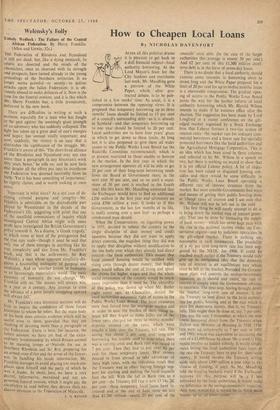Welensky's Folly
Unholy Wedlock : The Failure of the Central , African Federation. By Harry Franklin. s: (Allen and Unwin, 32s.) TRE Federation of Rhodesia and Nyasaland is still not dead; but, like a dying monarch, its courts are deserted and the minds of the chroniclers, once so obsessed with its strength and prospects, have turned already to the young princelings of the Northern territories. It no longer seems pointful—or seemly—to deliver attacks upon the fallen Federation; it is ob- viously absurd to make defences of it. Now is the time for the funeral oration; and it is this which Mr. Harry Franklin has, a little prematurely, delivered in his new book.
There are difficulties in writing at such a mornent, especially for a man who has fought in'the past against the seemingly giant strength of an adversary who has suddenly collapsed. The light has taken up a great deal of one's energies and hopes; has seemed vitally important; and I"W, suddenly, the victory is so easy that it diminishes the significance of the struggle. Mr. Franklin is aware of this. The short-lived alliance of the Rhodesias and Nyasaland may not rate more than a paragraph in any historian's work fifty years hence,' he tells us; and he now feels that despite all the effort put into its overthrow the Federation was doomed inevitably from its birth. 'Yet it has been something of importance,' he 'rightly claims, and is worth looking at once more.
Important in what ways? As a test case of de- clining colonial purpose and integrity—Mr: Franklin is admirable on the discreditable part played by Westminster in the decade of the Federation's life, suggesting with point that one of the manifold commissions of inquiry which investigated Central Africa might with more profit have investigated the British Government's policy towards it. As a drama, 'a Greek tragedy,' in which some at least of the protagonists had the true epic scale—though it must be said that °Ill): one of them emerges in anything like his trite complexity and size from Mr. Franklin's book, and that is the arch-enemy, Sir Roy Welensky, a man whose apparent simplicity dis- ggiies a fascinating ambiguity of purpose and resolution. And as 'another lesson in humanity to an increasingly materialistic world. The basic elements of humanity do not change,' Mr.' Franklin tells us, 'the masses will always win, in a year or a century. Any attempt to stem' the advance of a poor people struggling upward Will always fail.'
Mr. Franklin's own historical sections will do little to inspire the confidence of those future historians to whom he refers. But the main body of his book does contain evidence which will be useful even to them, provided that they are thinking of devoting more than a paragraph to the Federation. There is here, for instance, the fullest account we have yet had of the extra- ordinary 'brinkmanship' by which Britain seemed to be massing troops at ` Nairobi for use in Northern Rhodesia and Sir Roy preparing for
an armed coup d'etat and the arrest of the Gover-
nor. In handling his inside information, Mr. Franklin manages to avoid placing too much em- phasis upon himself and the party of which he was a leader. In short, here we have a _very decent, informative, restrained and not un- generous funeral oration, which it might pay the chroniclers to read before they devote their ex- clusive attention to the Federation of Malaysia.
T. 0. RANGER






































 Previous page
Previous page